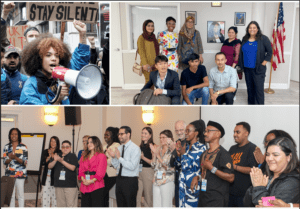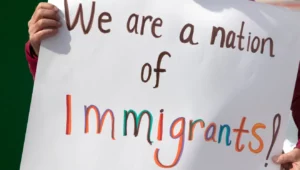March, Women’s History Month, has always carried a heavy weight for me—a month filled with memories of stark contrasts and the poignant reminder of privilege and opportunity. I was born in a small village in Afghanistan. Each March is a reminder of the disparate paths my cousin Razia and I have taken. Born just months apart, Razia and I shared a childhood intertwined amidst the sun-soaked streets of Kabul. However, our destinies diverged dramatically. While I came to the United States for higher education, Razia pursued dual degrees in Computer Science and Economics from the University of Kabul in Afghanistan.
Over a decade later, the chasm between our lives has widened into an unbridgeable gulf. Here in the U.S., I find myself leading campaigns, contributing to coalitions that serve millions, and relishing the privileges afforded by my newfound home. Yet, as I revel in my newfound liberties, the specter of March reminds me of the stark realities faced by Razia and countless others like her back in Afghanistan and in parts of the U.S.A. The juxtaposition of our lives serves as a poignant illustration of the systemic inequalities that plague societies around the world.
In Afghanistan, where Razia remains, the situation for women is dire. Record-low levels of satisfaction in their freedom to choose their lives and pursue education underscore the stark challenges they face. Historical progress in women’s education and societal participation has been marred by regression and severe restrictions, especially under Taliban rule. Since the Taliban’s return to power, edicts targeting women and girls have further constricted their access to public spaces, education, and employment, relegating them to the confines of their homes. The plight of Afghan women demands urgent attention and action.
In the United States, we have a moral obligation to honor our commitments and provide safety and security to our Afghan allies. The current situation facing Afghans admitted under temporary humanitarian parole is dire. The Afghan Adjustment Act offers a viable solution by establishing a pathway to lawful permanent resident status for eligible Afghans, providing them with stability as they rebuild their lives in the United States. Passing the Afghan Adjustment Act is not merely a matter of fulfilling promises; it’s a testament to our values of loyalty, integrity, and compassion. For over two decades, thousands of Afghan nationals served alongside U.S. troops, Razia’s brother being one of them. They risked their lives and their loved one’s to support our missions in Afghanistan. It’s time we reciprocate their loyalty and offer them a lifeline in their time of need.
As we commemorate Women’s History Month, let us not only reflect but also act. Let us stand in solidarity with women like Razia, championing their cause and advocating for a world where equality reigns supreme. As this March unfolds, we must honor the resilience of women like Razia, whose stories serve as poignant reminders of the systemic injustices that persist, compelling us to strive for a world where every woman can live a life of dignity, freedom, and opportunity. Let’s ensure legislative action by passing the Afghan Allies Protection Act and Afghan Adjustment Act, offering support and security to those who have risked their lives in service to our nation.
By: Fatima Saidi, Director of We Are All America



